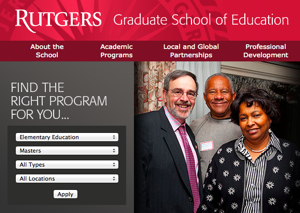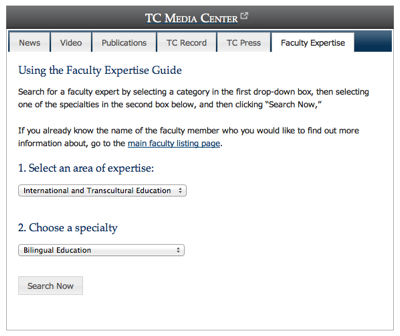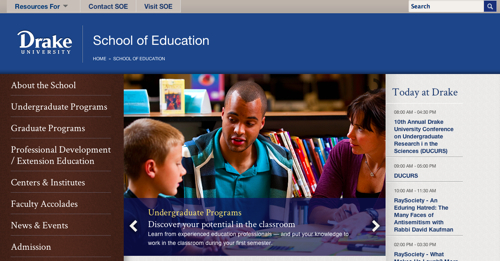Web Strategy for Graduate Schools Part 2: A Potpourri of School of Education Websites
Apr 12, 2013
To continue our series on graduate school web strategy, I visited the websites of 15 schools of education. Similar to the approach I used for writing a post about schools of business and law, I started with a few assumptions about what I might find. Unique aspects of schools of education include:
- Lots of degree options that seem similar, and frankly, are confusing (e.g., Ed.D., Ph.D., M.Ed., M.S., Executive Ed.D., Ed.S.)
- Lots and lots of events
- Lots of interesting, community-based centers and institutes that serve the public
- Lots of continuing education options for non-degree seeking, local teachers
Finally, I had a general impression that school of education sites would be less corporate, using imagery with more faces (female) and less facilities (campus architecture). Here’s what I observed when looking at the 15 websites:
Degree/Program Search
There are many degree options and I found two sites that offer a solid way to search for the program that’s right for you:
- The Find the Right Program for You… widget on the Rutgers University site is nicely done.
- Similarly, the left-column Programs widget on the Loyola University Chicago site is really helpful and easy-to-use.
Audience Gateways
Although audience gateway pages are a conventional way to serve a range of audience needs, I was looking for an interesting approach:
- I liked Northwestern’s Faculty & Staff Resources gateway page. The IA and clean layout keep the large number of links from feeling overwhelming.
- George Washington University presents a different set of homepage links depending on how you self-identify in an Explore GSEHD widget in the right column.
Given the expected number of prospective, non-degree seeking students, I was surprised that only two of the 15 schools I looked at include them in the audience gateways. The two I found use Education Professionals or Non-Matriculated Students as labels.
Event Calendars
Twelve of the 15 schools include events in the topic navigation, as a homepage feed, or both. But the calendar functionality on these sites is subpar. Many are just listings of events and offer no option for filtering and sorting events. This deficiency is not unique to schools of education; the implementation of a solid, full-featured calendar is something that continues to elude many, many higher ed sites.
Social Media
School of ed sites include social icons but not much social media integration was noted. Columbia University’s Teachers College integrates a Twitter feed and I did find blogs at:
Faculty Experts
Speaking of Teachers College at Columbia, I was drawn to the Faculty Experts tab in the TC Media Center section of the homepage. After a few minutes spent trying out their database, I realized it was the only reference to faculty experts I’d seen on my tour of school of education sites. This is surprising and is perhaps due to limited staff resources for the web in schools of education.
Centers and Institutes
Surprisingly, centers and institutes aren’t given prominence on 13 of the 15 sites I reviewed. And, I found no interesting way to list links to the center/institute websites. What I did find a lot of was…
Slide Shows
Of the 15 schools of education websites I looked at, 12 have the rotating/randomized homepage slide show. Unfortunately, only two of the 12 slideshows use exclusively brand-based feature content. The other 10 mix in announcements and news; or sometimes, offer no message-based content at all. A lost opportunity in my view. Actually, the impact of the centers and institutes that aren’t prominent enough (see above) would be wonderfully-evergreen feature content for a homepage slide show.
Look and Feel
Let’s wrap up by talking about look and feel. Cohesive brand identity between schools and colleges and “the university” was the topic of an earlier post on graduate web strategy. Now, I am the perpetual optimist and my next sentence feels less than positive; in fact, it’s probably the first negative statement I’ve made on the mStoner blog. Honestly, I was underwhelmed by the look and feel of the random set of school of education sites I visited. I was correct that there are a lot of female faces; many more people shots and fewer images of campus architecture (and that’s good!) Still, as compared to my tour of business and law graduate sites, many of the school of education sites were more dated and less professional looking. My gut says this is likely a question of resources. You don’t have to tell me that graduate business and law schools have more money than schools of education. I wonder if this is an argument for schools of education taking advantage of a better set of web templates offered by the university?
Can we talk about Drake University’s School of Education site?
The mStoner team was fortunate to work with the team at Drake University and a redesign of drake.edu launched in January 2013. The School of Education at Drake also relaunched their site using the new templates and it’s a great example of the power of a cohesive web presence.
Yeah, I know, mStoner worked with Drake and I work for mStoner. What am I going to say other than great about a site within the mStoner portfolio? My point is this: using a professionally-designed web template centrally offered by the university is a smart choice if resources and skills are limited at the school or college-level.
One final bit of advice: As you are benchmarking your own site, embrace the potpourri. Don’t focus on finding one graduate school website to use as your inspiration for greatness. Learn from the pieces and parts you find on a multitude of sites.


